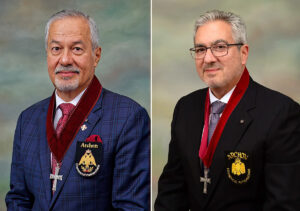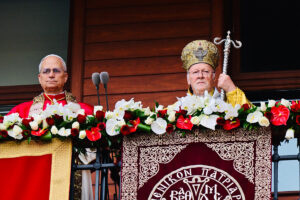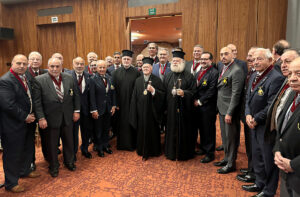Prince Charles’ words of concern and hope recall the words of His All-Holiness Ecumenical Patriarch Bartholomew in an interview last summer:
The persecution of Christians immensely concerns and is the source of great sorrow for us.
Unfortunately, such persecution is not confined to the Middle East. Christians are persecuted also in other corners of the world where exists a so-called “Christianophobia.”
In Europe and in many Western societies, policies of secularization and de-Christianization pose a grave challenge to Christianity. But, unknown to Christianity’s persecutors, it is a fact that faith in Jesus Christ is governed by the spirit of peace, love, forgiveness, and service; we do not seek to exploit and dominate others. The present reality in Europe and in other parts of the world proves that every cultural accomplishment and, most importantly, social achievement, springs from Christian principles.
Thus, the persecution of Christianity actually leads to the persecution of culture and of unique values that beautify our world.
Undoubtedly the situation occurring in the Middle East is alarming. Many Christians are persecuted, while others are forced to flee from their ancient homelands. We have voiced our serious concerns countless times to world leaders; we have reminded them that we have yet to discover the whereabouts of the two abducted Hierarchs, Greek Orthodox Metropolitan Paul and Syriac Bishop John Ibrahim, both of Aleppo. We anxiously wait to receive news from the regional and global authorities and pray for their safe return.
The Orthodox Church, as it has been stated in the Encyclical of the Holy and Great Council, convened on the island of Crete, Greece, in June 2016, “is particularly concerned about the situation facing Christians, and other persecuted ethnic and religious minorities in the Middle East. In particular, she addresses an appeal to governments in that region to protect the Christian populations – Orthodox, Ancient Eastern and other Christians – who have survived in the cradle of Christianity. The indigenous Christian and other populations enjoy the inalienable right to remain in their countries as citizens with equal rights.”
We hope that the light Prince Charles has now shed on the plight of these persecuted Christians will bring more global attention to their plight, in line with the call of His All-Holiness.
“Prince Charles Highlights Christian Plight in Mideast, Pleads for Peace,” VOA News, December 4, 2018:
LONDON — Prince Charles, heir to the British throne, Tuesday highlighted the resilience of embattled Christians in the Middle East during a special service in Westminster Abbey, focusing on their plight in a region that’s turned increasingly harsh for Christianity.
In a message of hope, Prince Charles said he had been privileged to have met so many “with such inspiring faith and courage” who were battling oppression and persecution, or who have fled to escape it. And he made a plea for peace, saying “extremism and division” are not inevitable.
“Throughout history, in these lands which are the cradle of faith for Jews, Muslims and Christians, communities of different beliefs have shown that it is possible to live side by side as neighbors and friends,” he said.
“Indeed, I know that in Lebanon, Muslims join Christians at the Shrine of our Lady of Lebanon to honor her together. And I know that there are Muslim faith leaders who have spoken out in defense of Christian communities and of their contribution to the region.”
His remarks from the abbey’s pulpit were made during a service attended by the Archbishop of Canterbury, Justin Welby, as well as Catholic, Jewish and Muslim religious leaders, including four patriarchs from the Middle East.
“All three of the great Abrahamic faiths believe in a loving, just and merciful God who cares for creation, who cares for his creatures and who expects us to care for one another,” he said….
A series of recent reports also have highlighted the predicament of Middle East Christians. Aid to the Church in Need, an international Catholic aid organization, documented significant violations of religious freedom in 38 countries, with many of the abuses caused by the spread of militant Islamism in parts of Africa, the Middle East and Asia.
The charity estimates that the Christian population in Syria has fallen dramatically since 2011, from 1.4 million to an estimated 450,000, with many fleeing as their churches have been destroyed. IS both in Syria and Iraq targeted Christians, subjecting them to atrocities, forcible conversion and enslavement.
At the height of the Syrian conflict, Christian refugees in southeast Turkey — many of whom were retreading the steps of their forebears who fled persecution in southern Turkey during the last century — said they often were seen as fair game by an assortment of jihadists and Islamist rebels….






